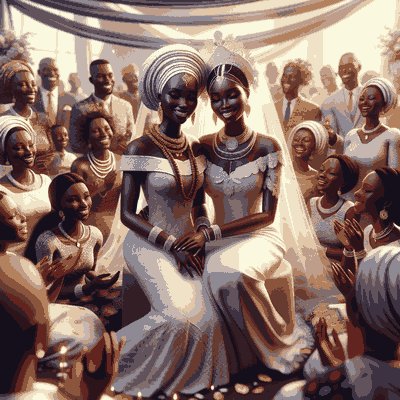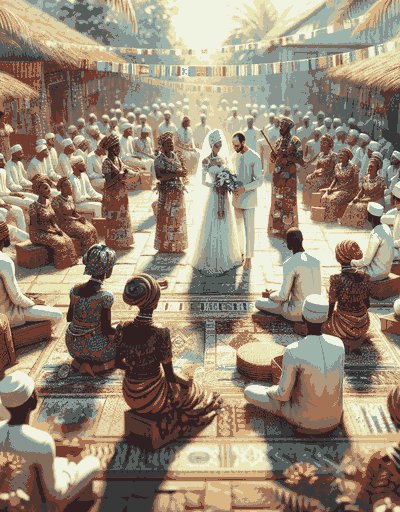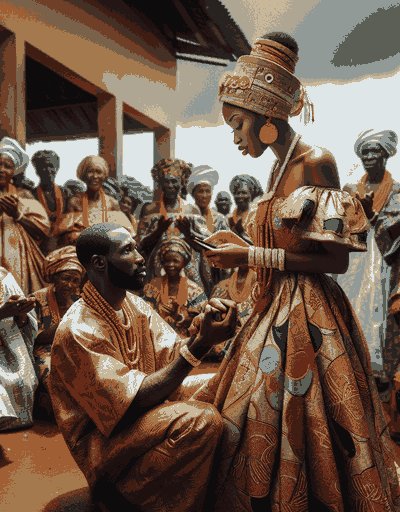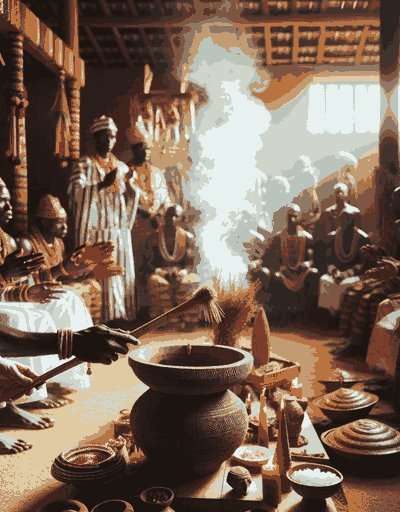Sierra Leone Wedding Traditions
Sierra Leonean wedding traditions are multi-day celebrations combining Islamic, Christian, and indigenous customs that typically last 3-7 days and involve 200-500 guests across pre-wedding negotiations, religious ceremonies, and elaborate receptions. These traditions encompass bride price payments (mboyamm-BOY-ah), engagement ceremonies with symbolic calabash presentations, bachelor’s eve celebrations, religious services, and festive receptions featuring traditional gumbeGOOM-bay music and ashobiah-SHOW-beematching attire, creating celebrations that cost between $2,000-$15,000 USD depending on the region and family status.

Overview of Sierra Leone Wedding Process & Timeline

- 12-18 months before: Initial family negotiations and bride price discussions
- 6-12 months before: Formal engagement ceremony with calabash presentation
- 3-6 months before: Ashobiah-SHOW-bee fabric selection and distribution to guests
- 1 month before: Final bride price payments and ceremony preparations
- 1 night before: Bachelor’s eve celebrations with gumbeGOOM-bay music
- Wedding day: Civil ceremony, religious service, and reception
- Post-wedding: Traditional rituals and family visits
Pre-Wedding Traditions and Ceremonies

What is Bride Price (Mboya) in Sierra Leone?
Mboyamm-BOY-ah is the traditional bride price payment that represents a formal agreement between families, typically ranging from $500-$5,000 USD plus gifts including 50-100 cups of rice, palm oil, salt, and fabric, paid by the groom’s family to acknowledge the bride’s value and secure marriage consent.
This centuries-old practice remains vital across all ethnic groups in Sierra Leone, with 77% of marriages still involving formal bride price negotiations according to local wedding planners. The specific components vary by region:
- Mende regions: 50-100 cups rice, 5 gallons palm oil, salt, kola nuts ($800-$3,000 total)
- Temne areas: Similar items plus designated cash envelopes for family members ($1,000-$5,000)
- Koranko communities: Extended payment period over 2-5 years with training arrangements
- Urban Freetown: Modernized cash payments with symbolic traditional items ($2,000-$10,000)
Modern couples increasingly negotiate bride prices that balance tradition with economic realities, though rural areas maintain more traditional payment structures.
Sierra Leone Engagement Ceremony Details
The engagement ceremony (en-TEM-nay_en-gay-je-ment) is a formal family gathering where the groom’s delegation presents the bride price in a symbolic calabash, requiring 20-50 family members from both sides and lasting 3-5 hours.
Key ceremony components include:
- Young girl carrier: 8-12 year old girl carrying white-clothed calabash
- Calabash contents: Needle and thread (unity), kola nuts (respect), Bible/Quran (faith), cash envelopes
- Verbal consent: Bride must consent three times publicly
- Family blessings: Elders provide prayers and advice
- Celebration feast: Rice-based dishes for 50-200 guests
Regional variations in engagement ceremonies:
Mende Engagement Traditions represent 31% of population
- Calabash carrier must be virgin girl under 12
- White cloth symbolizes marriage purity
- Kola nut breaking ceremony with elders
- Average cost: $1,500-$3,000 USD
Temne Engagement Customs represent 31% of population
- Multiple cash envelopes for specific relatives
- Palm wine (poyoPOY-oh) ceremony inclusion
- Traditional praise singers present
- Average cost: $2,000-$4,000 USD
Bachelor’s Eve Celebrations (Pre-Wedding Night)
Bachelor’s eve (en-KR-bach-laz_eev) is the bride-focused celebration occurring the night before wedding, featuring traditional gumbeGOOM-bayen-KR-goom-bay music performances lasting 6-12 hours with 50-150 female attendees wearing matching ashobiah-SHOW-bee attire.
Unlike Western bachelor parties focusing on both partners, Sierra Leonean tradition emphasizes the bride’s transition. The celebration includes:
- Gumbe singers: 3-5 traditional musicians ($200-$500 fee)
- Ashobi wearing: Matching fabric patterns for groups ($30-$50 per outfit)
- Traditional foods: Rice dishes, cassava leaves, groundnut stew
- Duration: Typically 6pm to 6am
- Location: Bride’s family compound
Modern adaptations in urban areas may include:
- DJ music alongside traditional singers
- Photography/videography services
- Shortened celebrations (6pm-midnight)
- Restaurant or hall venues
Official Wedding Ceremonies in Sierra Leone

Civil Marriage Requirements and Process
Civil ceremony is the legal marriage registration at government offices, requiring both parties’ presence, valid identification, and payment of 200,000-500,000 Leones ($10-$25 USD) in fees, typically completed in 30-45 minutes.
Required documentation includes:
- Birth certificates for both parties
- Valid national ID cards or passports
- Proof of single status
- Parental consent if under 21
- Two witnesses with valid IDs
The civil process follows British colonial legal framework, with ceremonies conducted at:
- District registry offices (Monday-Friday)
- Freetown City Hall for capital residents
- Local government offices in provincial areas
Religious Wedding Ceremonies: Islamic and Christian
Religious ceremonies follow either Islamic law (77% of weddings) or Christian traditions (22% of weddings), with services lasting 1-3 hours and involving 100-500 guests depending on the denomination and family prominence.
Muslim Wedding Elements (en-AR-ni-kah)
- Nikahnee-KAH ceremony with imam present
- MahrMARdower negotiation: $500-$5,000 USD
- Quranic recitations and prayers
- Witness requirements: 2 male or 1 male + 2 female
- Typical duration: 45-90 minutes
- Reception follows immediately
Christian Wedding Components
- Church service with vows exchange
- Banns publication 3 weeks prior
- Certificate signing by 2-4 witnesses
- Parent/godparent blessing visits
- Typical duration: 60-120 minutes
- Evening reception tradition
Interfaith Marriage Practices are common in Sierra Leone, with ceremonies incorporating:
- Both Bible and Quran in calabash
- Dual religious officiants possible
- Respect for both faith traditions
- 15-20% of urban marriages are interfaith
Traditional Wedding Ceremony Elements
Traditional ceremonies blend ethnic customs with religious services, featuring symbolic rituals like wrist-tying, broom jumping, and cowrie shell (en-YO-kow-ree) presentations, typically adding 30-60 minutes to the religious ceremony.
Essential traditional elements include:
Tying the Knot Ritual
- Wrists bound with kenteken-TAY cloth or braided grass
- Performed during vow exchange
- Symbolizes permanent union
- Cloth kept as marriage memento
- Cost: $50-$200 for special cloth
Jumping the Broom Ceremony
- Decorated broom creation: $100-$300
- Couple jumps together after vows
- Represents new household beginning
- Broom displayed in marital home
- Photographer captures moment
Cowrie Shell Symbolism
- Shells represent fertility and prosperity
- Incorporated in bride’s jewelry
- Used in wrist-tying ceremony
- Traditional currency significance
- Sets of 100-500 shells used
Wedding Reception Customs and Celebrations
Ashobi: Coordinated Wedding Attire Tradition
Ashobiah-SHOW-beeen-YO-ah-SHOW-bee is the matching fabric tradition where guest groups wear identical patterns, with fabric costing 50,000-200,000 Leones ($2.50-$10 USD) per yard and requiring 5-8 yards per outfit, creating visual unity among 20-100 person groups.
Ashobi group categories include:
- Bride’s family: Often wearing gelegeh-LEHhead wraps
- Groom’s family: Coordinated agbadaahg-BAH-dah or suits
- University classmates: School color incorporation
- Work colleagues: Professional group identity
- Church/mosque members: Religious community representation
The tradition creates stunning visual displays with:
- 5-10 different ashobi groups per wedding
- Professional tailoring costs: $30-$100 per outfit
- Fabric selection 2-3 months before wedding
- Colors coordinated with wedding theme
Traditional Food and Music at Receptions
Wedding feast traditions center on rice-based dishes serving 200-500 guests, with catering costs of $5-$15 per person, accompanied by live gumbeGOOM-bay music performances and modern DJ services lasting 4-6 hours.
Traditional menu components:
- Jollof rice: 100-200 pounds prepared
- Cassava leaves: With meat or fish
- Groundnut stew: Traditional favorite
- Fried plantains: Side dish staple
- PoyoPOY-oh (palm wine): 20-50 gallons
- Soft drinks: 20-40 crates
- Wedding cake: 3-5 tiers ($200-$800)
Music and entertainment costs:
- Gumbe traditional singers: $300-$800
- Modern DJ services: $200-$500
- Sound system rental: $300-$600
- Live band (optional): $500-$2,000
Wedding Gift Exchange Customs
Gift-giving traditions involve practical household items worth $20-$200 per guest, with close family members contributing appliances, furniture, or cash gifts of $100-$1,000 to help establish the couple’s new home.
Common wedding gifts include:
- Kitchen items: Pots, dishes, utensils sets
- Bedroom furnishings: Bedding, pillows, curtains
- Living room items: Chairs, tables, decorations
- Appliances: Fans, blenders, rice cookers
- Cash envelopes: $50-$500 from individuals
Gift presentation typically occurs:
- During reception speeches
- At designated gift table
- Through family representatives
- Recorded by appointed secretary
- Thank you notes sent within month
Post-Wedding Traditions and Rituals
Ijogolo: The Five-Fingered Marriage Apron
Ijogoloee-JOH-goh-lohen-MN-ee-JOH-goh-loh is a traditional five-fingered apron worn by married women after their first child’s birth, symbolizing completed marriage status and costing $50-$200 for handcrafted versions.
This tradition represents:
- Marriage culmination marker
- Fertility celebration symbol
- Social status indicator
- Connection to ancestors
- Pride in motherhood
Modern practice variations:
- Worn during special ceremonies only
- Simplified designs available
- Urban women may skip tradition
- Rural areas maintain practice
- Heirloom pieces passed down
Amacubi: Traditional Married Women’s Headwear
Amacubiah-mah-COO-beeen-MN-ah-mah-COO-bee are elaborate beaded headdresses worn by married women, particularly those with sons undergoing initiation, costing $100-$500 and signifying elevated social status within the community.
Traditional headwear types include:
- Simple beaded headbands: $20-$50
- Knitted ceremonial caps: $30-$80
- Elaborate beaded headdresses: $200-$500
- Long beaded strips for special status
- Modern simplified versions available
The practice indicates:
- Respect for husband
- Joy in son’s achievement
- Higher community status
- Cultural identity preservation
- 40% of rural women maintain tradition
Regional and Ethnic Wedding Variations
Mende Wedding Traditions (31% of Population)
Mende wedding customs feature childhood marriage arrangements with bride’s consent required at maturity, bride prices of $800-$3,000 including 50-100 cups rice, and ceremonies concentrated in southern/eastern regions involving 200-400 guests.
Distinctive Mende elements:
- Virgin girl calabash carrier requirement
- White cloth purity symbolism
- Kola nut breaking with elders
- Rice paramount in negotiations
- Palm oil quantities specified
- 3-day celebration minimum
Cost breakdown for Mende weddings:
- Bride price: $800-$3,000
- Ceremony expenses: $1,500-$4,000
- Reception costs: $2,000-$5,000
- Total average: $4,300-$12,000
Temne Wedding Traditions (31% of Population)
Temne marriage customs emphasize cash envelope distributions to specific relatives, incorporate poyoPOY-ohpalm wine ceremonies, and occur primarily in northern/northwestern regions with costs ranging $2,000-$8,000 total.
Characteristic Temne features:
- Multiple designated cash envelopes
- Praise singer performances mandatory
- Palm wine ceremony inclusion
- Extended family involvement
- Northern region concentration
- Islamic influence prominent
Temne wedding expenses:
- Bride price: $1,000-$5,000
- Envelope distributions: $500-$2,000
- Ceremony costs: $1,500-$3,000
- Total range: $3,000-$10,000
Koranko Marriage Customs (4% of Population)
Koranko wedding practices involve parents choosing daughters’ husbands at puberty, extended 2-5 year bride price payment periods with bride training at husband’s family home, and costs spread over multiple years totaling $1,500-$4,000.
Unique Koranko elements:
- Puberty-age arrangements
- Extended payment timeline
- Bride training period
- Father’s repayment obligations
- Northern region prevalence
- Gradual integration process
The multi-year process includes:
- Initial arrangement: $200-$500
- Annual payments: $300-$800
- Training period support
- Final ceremony: $1,000-$2,000
- Flexibility for difficulties
Contemporary Wedding Adaptations
Modern Urban Wedding Trends in Freetown
Urban weddings in Freetown and major cities blend traditional elements with contemporary practices, featuring three-part ceremonies (traditional, religious, reception) costing $5,000-$20,000 and involving professional vendors, shortened timelines, and Instagram-worthy decorations.
Modern urban adaptations include:
- Professional wedding planners: $500-$2,000 fees
- Luxury venue rentals: $1,000-$5,000
- Photography/videography: $800-$3,000
- Elaborate decorations: $1,000-$4,000
- Shortened ceremonies: 3-4 hours total
- Cocktail receptions: Western influence
Technology integration:
- Social media announcements
- WhatsApp invitation distribution
- Instagram live streaming
- Drone photography services
- LED lighting displays
- Digital gift registries emerging
Diaspora Wedding Adaptations Worldwide
Sierra Leonean diaspora weddings incorporate homeland traditions into host country requirements, with ceremonies split between locations, video conferencing for distant relatives, and modified bride prices ranging $1,000-$10,000 depending on location.
Common diaspora adaptations:
- Legal ceremony in residence country
- Traditional ceremony via video
- Modified bride price negotiations
- Shipped ashobiah-SHOW-bee fabrics globally
- Fusion reception menus
- Recorded ceremonies for homeland
Technology bridges distances through:
- Zoom engagement ceremonies
- WhatsApp family negotiations
- YouTube ceremony streaming
- Digital money transfers
- Virtual gift presentations
- Online RSVP systems
Las Vegas Wedding Options for Sierra Leoneans
Las Vegas wedding packages offer Sierra Leonean couples destination ceremony options starting at $159 for basic chapel services up to $10,000 for elaborate packages, with opportunities to incorporate traditional elements like ashobi wearing and gumbeGOOM-bay music recordings.
Vegas package components:
- Basic ceremony: $159-$500 (chapel, officiant, witness)
- Standard package: $500-$2,000 (includes photos, flowers, transportation)
- Premium package: $2,000-$5,000 (reception space, catering, entertainment)
- Luxury experience: $5,000-$10,000 (suite, limo, professional video)
Sierra Leonean adaptations possible:
- Traditional attire wearing permitted
- Cowrie shell decorations allowed
- Recorded gumbe music playback
- Modified jumping broom ceremony
- Small ashobi groups feasible
- Follow-up homeland reception planned
Las Vegas wedding receptions for Sierra Leonean couples can incorporate cultural elements within venue constraints, with buffet packages from $50-$150 per person, allowing traditional music playlists and coordinated ashobi group photos at iconic locations.
Modern Wedding Planning Considerations
Social Media’s Impact on Sierra Leone Weddings
Social media integration has transformed wedding planning with 65% of urban couples using Instagram for inspiration, WhatsApp for coordination, and Facebook for invitations, driving trends toward more elaborate decorations and professional photography services.
Digital transformation effects:
- Instagram wedding hashtags standard
- Pinterest board planning common
- WhatsApp group coordination (5-10 groups)
- Facebook event invitations
- YouTube tutorial influence
- TikTok dance rehearsals
This creates new pressures:
- Photography budget increases 40%
- Decoration expectations rise
- Guest outfit coordination complex
- Live streaming equipment needed
- Social media manager hired
- Post-wedding content creation
Balancing Traditional and Modern Elements
Contemporary couples navigate family expectations and personal preferences by maintaining core traditions like bride price while modernizing execution, with 78% keeping traditional ceremonies but shortening durations and 85% hiring professional vendors.
Common compromises include:
- Symbolic bride price amounts
- Shortened ceremony timelines
- Bilingual ceremony options
- Modern venue selections
- Traditional/Western outfit changes
- Fusion menu offerings
Generational negotiations involve:
- Elder consultation meetings
- Religious leader mediation
- Family compromise sessions
- Tradition explanation needs
- Modern element justification
- Respect maintaining strategies
Wedding Budget Considerations in Sierra Leone
Wedding costs in Sierra Leone range from $2,000 for modest ceremonies to $50,000 for elaborate celebrations, with average urban weddings costing $8,000-$15,000 and requiring 12-18 months of saving or community contributions.
Typical budget breakdown:
- Bride price/engagement: 15-25%
- Religious ceremony: 5-10%
- Reception venue/catering: 30-40%
- Attire and ashobiah-SHOW-bee: 10-15%
- Photography/videography: 5-10%
- Music/entertainment: 5-10%
- Decorations/flowers: 5-10%
- Miscellaneous/contingency: 10%
Cost-saving strategies include:
- Community contribution systems
- Shared ceremony dates
- Family catering assistance
- Borrowed decorations
- Amateur photography options
- Simplified guest lists
How much does a traditional Sierra Leone wedding cost?
Traditional Sierra Leone weddings cost between $2,000-$50,000 USD depending on location, family status, and guest count. Average costs are: rural weddings $2,000-$8,000, urban weddings $8,000-$15,000, and elaborate Freetown society weddings $20,000-$50,000. The bride price alone ranges from $500-$10,000.
What happens during a Sierra Leone engagement ceremony?
The engagement ceremony involves the groom’s family delegation visiting the bride’s home with a calabash carried by a young girl (8-12 years old). The calabash contains needle and thread, kola nuts, Bible/Quran, and cash envelopes. The bride must verbally consent three times, families exchange blessings, and a celebration feast follows.
How long do Sierra Leone weddings last?
Sierra Leone weddings typically span 3-7 days including: engagement ceremony (1 day), bachelor’s eve (1 night), civil ceremony (morning), religious ceremony (afternoon), reception (evening), and post-wedding visits (2-3 days). Some elaborate weddings extend to 10-14 days with multiple receptions.
What is ashobi and why is it important?
Ashobiah-SHOW-beeen-YO-ah-SHOW-bee refers to matching fabric worn by wedding guest groups to show unity and support. Groups include family members, colleagues, classmates, or religious communities. Each group wears identical patterns costing $30-$100 per outfit, creating stunning visual displays and strengthening social bonds.
Can non-Muslims have Islamic wedding elements in Sierra Leone?
Yes, interfaith marriages are common in Sierra Leone (15-20% in urban areas) due to high religious tolerance. Ceremonies often include both Bible and Quran in the calabash, dual religious officiants, and respect for both traditions. Many families have both Muslim and Christian members.
What gifts are appropriate for Sierra Leone weddings?
Appropriate gifts include practical household items: kitchen utensils ($20-$50), bedding sets ($50-$100), small appliances ($100-$200), furniture pieces ($200-$500), or cash envelopes ($50-$500 depending on relationship). Close family members often give major appliances or furniture worth $500-$1,000.
How is bride price (mboya) determined and paid?
Bride price is negotiated between families based on education level, family status, and regional customs. Payment includes cash ($500-$10,000) plus traditional items: rice (50-100 cups), palm oil (5+ gallons), salt, fabric, and kola nuts. Urban families may reduce traditional items but increase cash amounts.
What’s the difference between Mende and Temne wedding traditions?
While both involve bride price and similar ceremonies, Mende traditions emphasize the virgin calabash carrier and white cloth symbolism, costing $800-$3,000. Temne customs feature multiple cash envelopes for specific relatives and mandatory praise singers, costing $1,000-$5,000. Both represent 31% of the population.
Do Sierra Leoneans have destination weddings?
Yes, diaspora couples increasingly choose destination weddings, including Las Vegas packages ($159-$10,000) that can incorporate traditional elements like ashobi and modified ceremonies. Many couples have legal ceremonies abroad then traditional celebrations in Sierra Leone or their diaspora communities.
How has COVID-19 changed Sierra Leone wedding traditions?
COVID-19 introduced video streaming for distant relatives, reduced guest lists from 500 to 50-100, mask-wearing requirements, and outdoor venue preferences. Many couples postponed large receptions but maintained small traditional ceremonies. Digital participation became accepted for overseas family members.
Frequently Asked Questions
What is mboya and why is it important in Sierra Leone weddings?
Mboya is the traditional bride price in Sierra Leone, ranging from $500-$5,000 plus gifts. It symbolizes respect for the bride's family and commitment to the marriage, with 77% of marriages involving formal negotiations.
How long do Sierra Leone wedding celebrations typically last?
Sierra Leone weddings typically span 3-7 days, including pre-wedding ceremonies, religious services, and post-wedding celebrations.
What is ashobi and how is it used in Sierra Leone weddings?
Ashobi is matching fabric worn by wedding guests, costing $2.50-$10/yard. It creates visual unity among 20-100 guests and is a significant cultural tradition.
Are interfaith marriages common in Sierra Leone?
Interfaith marriages comprise 15-20% of urban weddings, with couples often incorporating both Islamic and Christian traditions into their ceremonies.
What is the typical cost of a traditional Sierra Leone wedding?
Costs vary by region: Mende ($4,300-$12,000), Temne ($3,000-$10,000), and Koranko ($1,500-$4,000), including ceremonies and celebrations.
What role does music play in Sierra Leone weddings?
Gumbe music is central to celebrations, often combined with modern DJ services to create a blend of traditional and contemporary entertainment.
How many guests typically attend a Sierra Leone wedding?
Sierra Leone weddings usually host 200-500 guests, with religious ceremonies accommodating 100-500 attendees.
What are important post-wedding symbols in Sierra Leone?
The ijogolo (five-fingered marriage apron) and amacubi (beaded headdresses) are significant symbols of married status and community standing.
What documents are needed for a civil marriage in Sierra Leone?
Civil marriages require valid identification, proof of consent, and payment of fees ranging from $10-$25.
How are traditional and modern elements balanced in contemporary weddings?
Urban and diaspora couples often blend traditional customs with modern elements, incorporating technology while maintaining cultural rituals.